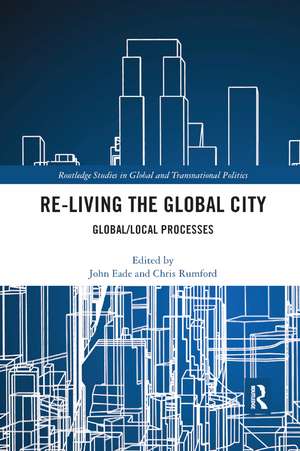Re-Living the Global City: Global/Local Processes: Routledge Studies in Global and Transnational Politics
Editat de John Eade, Chris Rumforden Limba Engleză Paperback – 12 dec 2019
After reflecting upon how debates in the field have developed since the original publication, the contributors seek to drive the debate forward through discussion of contemporary themes and issues such as borders and bordering, social movements, community and global connectivity. They consider the ways in which the city produces different experiences of globalization for different people and examine the various accounts of the ways in which new forms of sociality are definitive of contemporary globalization and cosmopolitanism.
Drawing together scholars from a range of disciplines including international relations, politics, sociology, urban studies and anthropology, this work will be of great interest to all students and scholars of global studies and globalization.
Preț: 389.66 lei
Nou
Puncte Express: 584
Preț estimativ în valută:
74.56€ • 78.06$ • 61.69£
74.56€ • 78.06$ • 61.69£
Carte tipărită la comandă
Livrare economică 05-19 aprilie
Preluare comenzi: 021 569.72.76
Specificații
ISBN-13: 9780367871239
ISBN-10: 0367871238
Pagini: 152
Dimensiuni: 156 x 234 x 8 mm
Greutate: 0.45 kg
Ediția:1
Editura: Taylor & Francis
Colecția Routledge
Seria Routledge Studies in Global and Transnational Politics
Locul publicării:Oxford, United Kingdom
ISBN-10: 0367871238
Pagini: 152
Dimensiuni: 156 x 234 x 8 mm
Greutate: 0.45 kg
Ediția:1
Editura: Taylor & Francis
Colecția Routledge
Seria Routledge Studies in Global and Transnational Politics
Locul publicării:Oxford, United Kingdom
Public țintă
Postgraduate and UndergraduateCuprins
Chapter One - Global Transformations in the Metropolis, Then and Now - Darren O’Byrne
Chapter Two - Living the Global Stranger - Chris Rumford
Chapter Three - Homecomings: Provincializing the Global City - Jörg Dürrschmidt
Chapter Four - Transnational Subjectivities: Revisiting Community in the Global City - Myria Georgiou
Chapter Five - Mobility without Movement: G/local Bordering Processes as a Fundamental Aspect of Globalization and Global Connectivity - Anthony Cooper
Chapter Six - Making Yourself at Home: Transnational Repertoires of Action on the Move - Ranji Devadason
Chapter Seven - When Did Cities Really Become ‘Global’? Against Assumptions of Historical Uniqueness in Globalization Theory - David Inglis
Chapter Eight - Opportunities Lost? What We Should Have Learned- and What We Can Still Learn about Theorizing the Global - Barrie Axford
Chapter Two - Living the Global Stranger - Chris Rumford
Chapter Three - Homecomings: Provincializing the Global City - Jörg Dürrschmidt
Chapter Four - Transnational Subjectivities: Revisiting Community in the Global City - Myria Georgiou
Chapter Five - Mobility without Movement: G/local Bordering Processes as a Fundamental Aspect of Globalization and Global Connectivity - Anthony Cooper
Chapter Six - Making Yourself at Home: Transnational Repertoires of Action on the Move - Ranji Devadason
Chapter Seven - When Did Cities Really Become ‘Global’? Against Assumptions of Historical Uniqueness in Globalization Theory - David Inglis
Chapter Eight - Opportunities Lost? What We Should Have Learned- and What We Can Still Learn about Theorizing the Global - Barrie Axford
Notă biografică
John Eade is Professor of Sociology and Anthropology at the University of Roehampton and former Executive Director of CRONEM (Centre for Research on Nationalism, Ethnicity and Multiculturalism) which links Roehampton and the University of Surrey.
Chris Rumford was Professor of Political Sociology and Global Politics at Royal Holloway, University of London.
Chris Rumford was Professor of Political Sociology and Global Politics at Royal Holloway, University of London.
Descriere
After reflecting upon how debates in the field have developed since the original publication, the contributors seek to drive the debate forward through discussion of contemporary themes and issues such as borders and bordering, social movements, community and global connectivity. They consider the ways in which the city produces d












